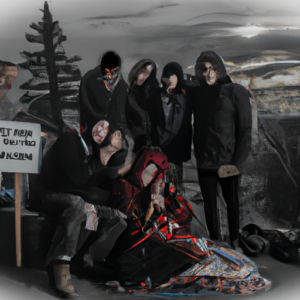The Ripples of the Opioid Crisis in Canada’s Northern Territories
Despite being relatively disconnected from the hustle and bustle of cities, Canada’s northern territory is not immune to the opioid crisis penetrating their communities. The opioid crisis has a devastating effect on all populations, but for these remote areas, the impacts are even more profound – involving a surge in crime rates, housing crises, and an alarming rise in homelessness. APTN News recently covered this dire scenario, bringing illuminative insights into the situation in the Northwest Territories (NWT).
The Opioid Crisis: Unearthing Layers of Societal Impact
Increased Homelessness and Crime
The APTN News article outlines the tragic increase in homelessness, particularly among emergency evacuees who are currently in transit due to health issues, wildfires, or severe weather events – situations that are already challenging without the added burden of opioid addiction.
An unexpected consequence of the opioid crisis has been the significant influx in crime rates in the NWT. Subsequent to the rise in opioid usage, communities have seen a surge in petty crime, with people resorting to it as a means to procure the drugs.
Fort Simpson’s Emergency Housing Crisis
In Fort Simpson, a small community in the NWT, a significant number of homeless persons were displaced following the lifting of an evacuation order from the Fort Simpson Heritage Park. Most of the individuals belong to the most vulnerable groups, including those afflicted by opioid addiction. This instance encapsulates how the opioid crisis interplays with both homelessness and emergency situations, thereby escalating difficulties and complexities for relief efforts.
Addressing the Crisis: Steps Taken, and Possible Ways Forward
Investments in Naloxone Kits
In response to the opioid crisis, the Canadian government has made significant efforts towards overdose prevention with increased investments in naloxone kits. However, while these kits offer an immediate, life-saving solution to opioid overdoses, they do not address the underlying causes and persistent issues leading to such a dire situation in the first place.
The Opioid Class Action Effort
Beyond naloxone kits, there’s also a wave of opioid class action suits. These lawsuits aim to hold pharmaceutical companies accountable for their role in propagating misleading marketing regarding the addictiveness of opioids, which is believed to have inadvertently triggered the current opioid epidemic. While this action may potentially prompt massively beneficial systemic changes, it does not immediately alleviate the struggles of those currently caught in the throes of addiction.
Integrative Drug Policies & Mental Health Support
Moving forward, creating supportive environments for reintegrating persons dealing with addiction into society is vital. Implementing integrative drug policies that emphasize harm reduction alongside conventional punishment-based approaches could prove successful. An increase in mental health support resources, focusing on early intervention and long-term support, is also integral to a holistic approach towards handling the opioid crisis.
Key Points:
- Remote communities in Canada’s North are experiencing a surge in homelessness and crime as a direct impact of the opioid crisis.
- Enhanced investments in naloxone kits offer immediate, life-saving solutions to opioid overdoses but fail to address long-term issues.
- Opioid class-action efforts aim to hold pharmaceutical companies accountable for their role in the crisis, but this relief will not be immediate.
- A combination of supportive drug policies and an increase in mental health resources are crucial for a holistic, sustainable approach to combatting the opioid crisis.
In conclusion, the effects of the opioid crisis radiate far beyond health consequences, deeply ingraining themselves into society’s structural fabric and leading to other significant issues such as homelessness and crime. Nay, the opioid crisis is not just a health crisis. It’s a social crisis. And as such, it requires comprehensive, multi-faceted solutions. Whether it’s naloxone, opioid class actions, or the development of more understanding and inclusive policies, a holistic, empathetic approach is necessary to alleviate the weight of the opioid crisis and pave the path towards recovery.
